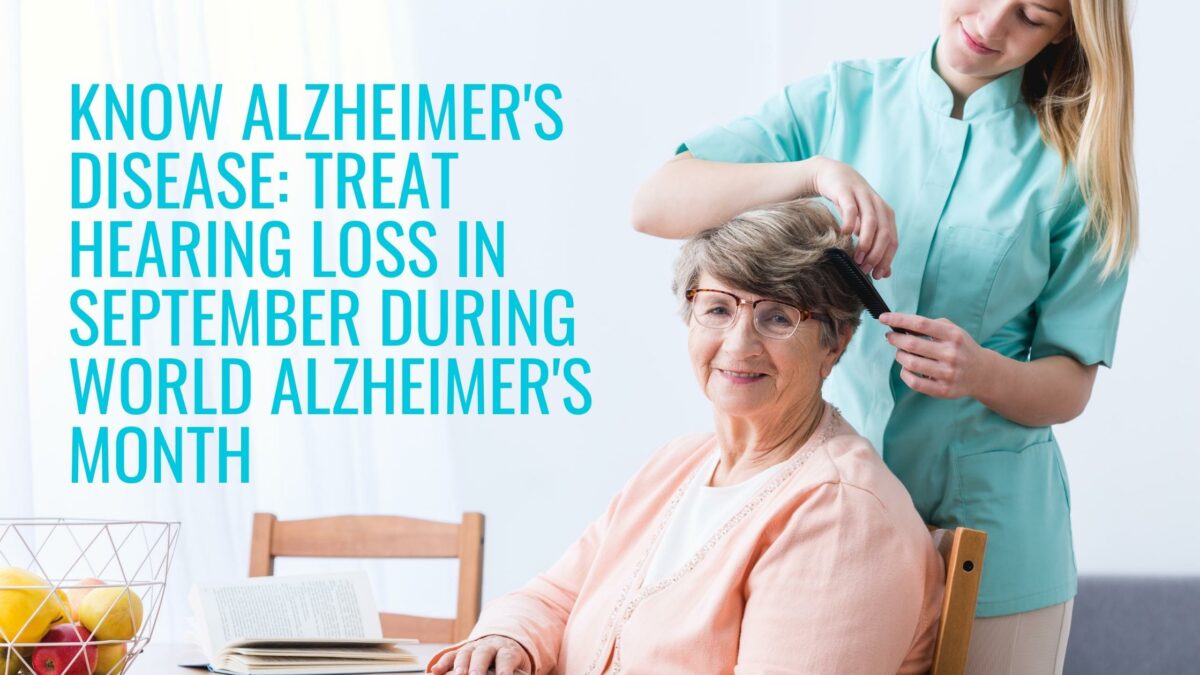September is World Alzheimer’s Month. This month people around the globe are working tirelessly to raise awareness of Alzheimer’s Disease and dementia. World Alzheimer’s Month aims to reduce the stigma surrounding dementia and encourage seniors to seek treatment. Did you know that hearing loss has been linked to dementia and Alzheimer’s, and anyone struggling to hear has a higher risk of developing dementia? If you have hearing loss, be on the lookout for the early signs of Alzheimer’s Disease.
What is the connection between Hearing Loss and Alzheimer’s Disease?
Alzheimer’s Disease, the most common kind of dementia, has been linked to hearing loss, and it’s not hard to see why. Hearing loss affects the brain in profound ways, increasing cognitive decline, creating communication barriers, and social isolation and depression. Living with untreated hearing loss is a significant risk factor for dementia since those with hearing loss aren’t keeping their brains active and healthy. Anyone struggling to hear could soon face dementia, and this progressive brain disease slowly affects memory, cognitive abilities, reasoning capabilities, behavior, and emotion.
How to tell if someone might have Alzheimer’s Disease
If you want to keep your brain healthy as you age, then be on the lookout for these early signs of Alzheimer’s Disease.
Forgetfulness: One of the earliest signs of dementia or Alzheimer’s Disease is memory loss. Don’t worry if you sometimes forget what you ate for dinner last night; that happens to everyone. When dementia begins to affect memory, you’ll notice that you can’t remember recently learned information. Did you set up a coffee date with a friend or schedule an appointment that completely slipped your mind? If you’re writing notes for yourself to remember or forgetting things you’d typically remember with ease, you may have dementia.
A sense of confusion: Have you ever found yourself at the grocery store and forgotten how or when you got there? Do you have a hard time remembering what month it is? People with Alzheimer’s can quickly get confused about dates and times or experience confusion about where they are or what tasks they perform.
Difficulty planning: Another sign of Alzheimer’s is having a tough time creating and following a plan. Do you struggle to follow a recipe you’ve made a hundred times or get stuck creating your monthly budget? Maybe you can still do these tasks, but it takes you twice as long as it used to. This is a symptom of dementia, and you shouldn’t ignore it.
Problems communicating: For people with Alzheimer’s, one of the most noticeable signs is having trouble following conversations. You’re more likely to stop halfway through a sentence because you forgot what you were saying or struggle with finding the right word. You may call things by the wrong name and have a tough time understanding what others are saying.
A tendency to lose things: Do you often lose things like your phone or keys? Is it challenging for you to think back on what you did this morning and retrace your steps to find out where you left them? This is another sign of Alzheimer’s and one of the reasons people with dementia often feel so confused. They may even accuse someone of stealing their valuables because they simply cannot remember where they put them.
Treating Hearing Loss
Do any of these early warning signs of Alzheimer’s Disease sound familiar? If you think you might have dementia, visit your family doctor right away. Then visit us to learn about ways to keep your brain healthy. Investing in your hearing health will give you back the ability to play with your grandkids, talk on the phone with ease, and enjoy going out for dinner with friends.
Investing in quality hearing devices is one of the best ways to treat Alzheimer’s Disease, allowing you to reconnect with friends and loved ones, be more active, and keep your mind healthy. Good hearing reduces cognitive decline, strengthens your brain, improves communication, and slows the onset of Alzheimer’s Disease. If you want to enjoy a life of clear hearing and reduce your risk of dementia, visit us today and take control of your hearing health.

